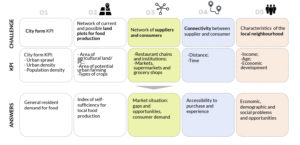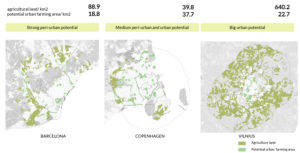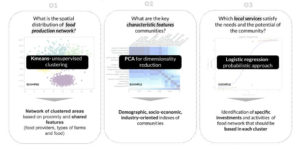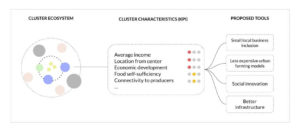The task required to pick up an urban challenge and develop a City Science Problem Framing Proposal in a few days workshop.
The topic of localized food systems was chosen
PROBLEM FRAMING
“In order to feed a population expected to grow to 9 billion people by 2050, the world will have to double its current food
production. -World resources institute.
Due to the rapid urbanization, metropolitan areas deals with the problem of food insecurity.
– Food insecurity is defined as a household level economic and social condition. In 2020, 205 million people were food
insecure at some time during the year.
–Affordability: EU countries are not facing food shortage, but the war in Russia and Ukraine is causing food price raising
.-Accessibility: Food is highly rely on import, local food system is failing in EU countries.
LITEATURE REVIEW

MAIN HYPOTHESIS
We raise a main hypothesis- poli-centered network between different urban and peri-urban food agents can minimize
food insecurity in urban epicenters. This statement is followed by several assumptions: 1. Ensuring better food stability;
2. Reducing food waste; 3. Creating economic, social and ecological benefits.
PROPOSAL AND SOLUTION RATIONALE
Unlike the current one, proposed food system suggests to release the biggest production tension from
rural areas and to exploit the potential land plots nearby the city.

OUR CONTRIBUTION

ANALYTICAL DESCRIPTIVE MODEL
Analytical model aims to escribe the observed reality. It provides quantitative, qualitative and visual
descriptions.

MODEL 01. URBAN SPRAWL AND DENSITY

MODEL 02. NETWORK OF CURRENT AND POSSIBLE LAND PLOTS FOR PRODUCTION

PREDICTIVE MODEL. VALIDATION OF HYPOTHESIS
Predictive model aims to describe a deep level of understanding of correlation and causality.
The projects provides an example, which decision-outcome relations could help validate sophisticated
hyphothesis.

RECOMMENDATIONS MODEL
According to previous analysis, recommendations model could provide informed, high quality evidence-based
recommendations to inform the decision-making processes and optimize the results.


